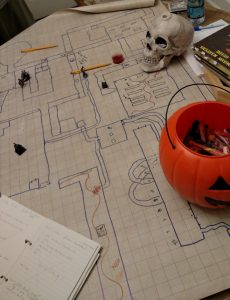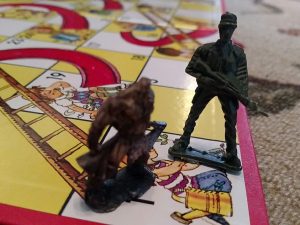Well, well, well…look who the cat dragged in! That’s right, your old digital pal, the Mad Cleric. And what exactly have I been doing? Well, I’ll show you before I tell you:
A little bit of this…
A little bit of that…
Oh, and of course, some…
That’s right, I may be the only person to have logged plays of Chutes & Ladders on BoardGameGeek.com (my games are logged here). I’d apologize for not blogging, but I really have been busy with very important things. Between our third child’s birth and moving, I’ve been lucky to fit in any gaming–let alone blog about it! But on this Thanksgiving break, I’m glad to find a little extra time to fill in all my online gaming friends on my recent shenanigans.
So, here for the first time in six months, my friends, is my progress report on Chasing the Dragon:
The Adventure Continues!
What is Chasing the Dragon, you ask? For a lengthy explanation, read here. In short, inspired by the beginning of 5th Edition D&D, I wanted to go back and experience old-school roleplaying games. So I’ve been playing through as many AD&D modules as I can get my hands on with a focus on modules written by Gary Gygax himself.
So what progress has been made?
From January through April, I DMed N1 – Against the Cult of the Reptile God. This ended intentionally before the birth of our third-born, so that we could take the summer off. I eased back into the RPGs with Jeff Romo‘s help who DMed a really great mystery adventure for 5th Edition (my first 5e adventure, for the record).
Then in the final week of August, our AD&D group restarted in earnest. Two players carried over from the Reptile God module, but we picked up three others! We did a short two session home-brew adventure that led into A0 – Danger at Darkshelf Quarry. When that wrapped in October, I ran two sessions of the Star Wars RPG, Age of Rebellion.
What I learned:
Scaling Adventure Difficulty in AD&D
From a strict AD&D perspective, I learned something about scaling adventure difficulty. Here’s something they don’t tell you in the modules (usually):
Cult of the Reptile God “is designed for 4-7 characters of first through third levels,” the cover of the module says. Well, what the heck does that mean? If you use pregenerated characters from a tournament module, they will provide a mix of various levels and classes depending upon how many players you have. But here’s what I’ve learned. In this circumstance:
- If you have seven players, they should be first level.
- If you have four players, they should be third level.
But what about five or six players? I had five for this module, so I had all the players roll up 2nd level characters, except for my magic-user and cleric. They were allowed to be 3rd level, not only because those classes are so important, but also because they’re so easily killed off. The balance worked very well.
When I applied this principle to A0 – Danger at Darkshelf Quarry, I found that the difficulty evened out perfectly. Dungeons were still brutally hard, but the party was able to make forward progress through careful planning.
The benefits of long-term committed players
Another thing that I learned is how much easier it is to DM/GM for players who are committed for the long haul. This is something that I’d taken for granted, due to having GMed two very long-running RPG groups. But from last fall until the summer, I wasn’t playing in any groups that were super-committed to ongoing play–at least not within the same storyline or system. But when we relaunched AD&D in August, everything changed.
Two players from Reptile God had fallen in love with AD&D as a system and wanted to continue the story. So between the three of us, we were able to drum up three other players who were ready to play!
Here’s the big difference: when players expect to play long-term, you get richer characters. And when you get richer characters, it becomes easier to motivate players and create compelling tension. When characters hang around for a while, the story becomes less about the MacGuffin and more about the characters. Do you know why I’m jazzed to get back to AD&D? I want to know what the fighter, the monk, and their goblin henchman have discovered, as they searched the areas around Flen! I want to know how our lawful good cleric, now scarred with the sign of the Elder Elemental Eye, has fared in his penance to Pelor. I want to know how our magic-user and our thief reconnected with their families back home. I’m curious to see how their stories progress, more than how “the story” progresses.
In sum, when players are committed, it gives the Game Master a lot more compelling material to work with!
It was fun while it lasted…
No, our group is not disintegrating after a solid year of gaming. And, for the record, I play RPGs usually nine months a year. I almost always take the summer off. I treat it basically like the school calendar. Anyway, our group will get back together during week one of December. But how many times have you had a group that gets together for a few weeks…a few months…only to vanish like a puff of smoke. “It was fun while it lasted,” you opine. Why does it seem so hard to keep an RPG group going long-term?
As a DM, it’s easy to doubt yourself. When I ran my two-session AD&D home-brew, I was very nervous and self-doubting. Would it be too lethal for the newcomers and too easy for the Reptile God veterans? Would a travel-centric adventure be too anticlimactic or boring? The bottom line is, as a Game Master, it’s easy to find reasons to doubt yourself. But one of the greatest pressures that DMs put on themselves is that of “keeping the band together.”
Here are the cold hard facts: everything that we begin will end sometime. So, yes, every RPG group will end at some point. But doubting yourself as a game master or a group leader is not going to extend the life of your group. We all want to have a fun gaming group that lasts for a reasonable amount of time. And yet again, I find myself in a great one. So how can you find yourself in the same position? It’s really not too tough:
- Get two or three people to commit to a game you want to play
Some of my favorite gaming memories come from the first few sessions of adventures, when it was just the Game Master and two or three players. The danger is real. The excitement is palapable. Things are simpler than they’ll every be and yet anything can happen! I’ve even DMed for one player before–it’s possible! But if you can dig up two or three committed folks, who will play, you’re already on your way to a long-term group.
- Set a weekly time to play in person or online
I know many people will disagree with me (as they have many times before online). But in my opinion from limited (seven years) experience, weekly campaigns seem to work better long-term. Why weekly? First, you only get seriously committed players signing up for weekly gaming. Second, when you’re on a weekly schedule, it’s not as big a deal when you miss a session. If a player can’t make it or if you have to cancel, either way it’s not that big a deal. Because of these two reasons, my groups always aim for weekly.
- Have your players invite other players
Your RPG group is not truly yours. In the Southern US, we’d say it’s y’all’s. Let the players take some ownership in the group by inviting friends or family to play. Strong RPG groups are founded on relationships, so allow the group to grow according to existing relational connections. If you do, I think it will pay off with more impact long-term.
There’s no need to wish for a group, while your RPG books get dusty on the shelf. If I can pull off a long-term RPG group playing a game that’s over forty years old, you can do it with your game of choice! We don’t call ourselves gamers because we don’t game. We’re gamers, because we love gaming! So get your rulebooks and your calendar out, get that weekly game on the books!
Sound off in the comments below. How have you gotten a long-running RPG group going well? What tips should we pass on?
Disclosure of Material Connection: the links in the post above are “affiliate links.” This means if you click on the link and purchase the item, I will receive an affiliate commission. Regardless, I only recommend products or services I use personally and believe will add value to my readers. I am disclosing this in accordance with the Federal Trade Commission’s 16 CFR, Part 255: “Guides Concerning the Use of Endorsements and Testimonials in Advertising.”




Hi,
I came across your blog browsing the internet for some 1st Edition AD&D books. I played 1st edition AD&D back in the early 1980’s. Fast-forward to recently and I’ve introduced my friends three children to it. We played Hommlet, myself as DM, and they loved it. It was great to see youngesters happily discard their phones and computers and sit around a log fire, listen, talk, laugh, adventure and hey presto half a day flashed past!
Best regards to you from Scotland!
Mark